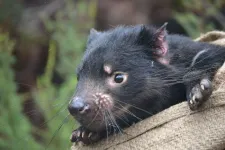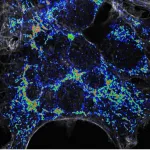(Press-News.org) Andrew Lupini, a scientist and inventor at the Department of Energy’s Oak Ridge National Laboratory, has been elected Fellow of the Microscopy Society of America.
MSA fellows are senior distinguished members who have made significant contributions to the advancement of microscopy and microanalysis through scientific achievement and service to the scientific community and the society. Lupini was one of only four scientists named an MSA Fellow this year.
Lupini was cited “for foundational contribution of theory and practice of aberration correction STEM [scanning transmission electron microscopy], and applications for high-resolution EELS [electron energy loss spectroscopy] and e-beam atomic fabrication.”
Karren More, director of ORNL’s Center for Nanophase Materials Sciences, also an MSA fellow, said, “Andy’s contributions to the field of microscopy cannot be overstated. He is an exceptional and prolific scientist whose range of research spans microscopy to optics, quantum mechanics and nanotechnology. This is a well-deserved honor.”
Lupini is a widely cited physicist and microscopist who earned his doctorate in physics from the Cavendish Laboratory of Cambridge University in the United Kingdom in 2001. Lupini is the leader of the Scanning Transmission Electron Microscopy group at CNMS and is one of the inventors of the first aberration corrector in a scanning transmission electron microscope to demonstrate improved resolution.
ORNL’s CNMS, a DOE Office of Science user facility, offers the national and international user community access to staff expertise and state-of-the-art equipment for a broad range of nanoscience research, including nanomaterials synthesis, nanofabrication, imaging, microscopy, characterization and theory-modeling simulation.
Lupini’s research interests include all forms of electron microscopy and spectroscopy, especially as applied to new or quantum materials, including high energy-resolution EELS. He was named a Fellow of the American Physical Society in 2021.
UT-Battelle manages ORNL for DOE’s Office of Science, the single largest supporter of basic research in the physical sciences in the United States. The Office of Science is working to address some of the most pressing challenges of our time. For more information, please visit energy.gov/science. — Lawrence Bernard
END
ORNL’s Lupini elected fellow of the Microscopy Society of America
2023-04-20
ELSE PRESS RELEASES FROM THIS DATE:
Purdue Ventures invests in antibody-based cancer therapeutics company
2023-04-20
WEST LAFAYETTE, Ind. – Purdue Ventures, which manages three funds to support Purdue University-connected startups, has invested $250,000 in TRIO Pharmaceuticals Inc., a cancer immunotherapeutics startup founded by a Purdue University biophysics and structural biology alumnus. The company’s antibody-based therapeutics strengthens the body’s defense, the immune system, to eradicate cancer.
Purdue Ventures’ investment is part of a larger $2.2 million series seed-funding ...
Jefferson Lab stays gold by staying green
2023-04-20
NEWPORT NEWS, VA – Finding ways to purchase sustainable products for the work of science has yielded another golden award. The U.S. Department of Energy's Thomas Jefferson National Accelerator Facility has been recognized with a gold-level GreenBuy Award for its purchase of environmentally friendly products in fiscal year 2022.
The GreenBuy Award Program honors DOE sites that go beyond the minimum requirements for purchasing products that are energy efficient, water efficient and recycled. Participating sites can qualify for three levels of the award: gold, silver and bronze.
“The award is to show our mindset is ...
Evolution of two contagious cancers affecting Tasmanian devils underlines unpredictability of disease threat
2023-04-20
PRESS RELEASE FROM THE UNIVERSITY OF CAMBRIDGE
EMBARGOED UNTIL 19:00 BST LONDON TIME/14:00 US EASTERN TIME THURSDAY, 20 APRIL 2023
Paper and photos available at: https://drive.google.com/drive/folders/1YaEEaTCCMRt85NXmCSpeO15YOrIRaXpO?usp=share_link
Transmissible cancers, which occur only rarely in the animal kingdom, are spread by the transfer of living cancer cells. In the case of Tasmanian devils, the cells are transferred through biting – a behaviour that is common in devils especially in fights over mates and food.
Tasmanian devils are susceptible to two fatal transmissible cancers called devil facial ...
A gene involved in Down syndrome puts the brakes on neurons' activity in mice, new study shows
2023-04-20
Researchers from the University of Michigan have found that an extra copy of a gene in Down syndrome patients causes improper development of neurons in mice.
The gene in question, called Down syndrome cell adhesion molecule, or DSCAM, is also implicated in other human neurological conditions, including autism spectrum disorders, bipolar disorder and intractable epilepsy.
The cause of Down syndrome is known to be an extra copy of chromosome 21, or trisomy 21. But because this ...
Cracking the case of mitochondrial repair and replacement in metabolic stress
2023-04-20
LA JOLLA (April 20, 2023)—Scientists often act as detectives, piecing together clues that alone may seem meaningless but together crack the case. Professor Reuben Shaw has spent nearly two decades piecing together such clues to understand the cellular response to metabolic stress, which occurs when cellular energy levels dip. Whether energy levels fall because the cell’s powerhouses (mitochondria) are failing or due to a lack of necessary energy-making supplies, the response is the same: get rid of the damaged mitochondria and create new ones.
Now, in a study published in Science on April 20, 2023, Shaw and team cracked ...
The climate crisis and biodiversity crisis can’t be approached as two separate things
2023-04-20
Human beings have massively changed the Earth system. Greenhouse-gas emissions produced by human activities have caused the global mean temperature to rise by more than 1.1 degrees Celsius compared to the preindustrial era. And every year, there are additional emissions of carbon dioxide, methane and other greenhouse gases, currently amounting to more than 55 gigatonnes of carbon dioxide equivalent. This unprecedented climate crisis has consequences for the entire planet – the distribution of precipitation ...
Economic growth alone is not enough to eliminate rabies
2023-04-20
Economic growth alone may not be enough to deliver the internationally agreed target to end human deaths from dog mediated rabies, according to new research from the University of Surrey. The study identifies that targeting vulnerable populations and improving responsible pet ownership are urgently needed to eradicate the deadly disease, which has strong associations with poverty.
In a landmark study, Surrey researchers investigated whether incidences of rabies are an inevitable consequence of poverty or whether other measures of development, such as healthcare access, can play a role in tackling this preventable disease.
Dr ...
PLOS Genetics to launch Microbial Section
2023-04-20
SAN FRANCISCO — PLOS today announced that PLOS Genetics is expanding the scope of its journal with a renamed section called Microbial Genetics. This section will replace the former Prokaryotic Genetics section to emphasize research on microbes more broadly with the aim to publish studies that use genetic approaches to provide insights into how bacteria as well as archaea and their phages/viruses, fungi (including yeasts and filamentous fungi), and protists function and interact with the biotic and abiotic world.
PLOS Genetics has an established presence in the fungal genetics community, but this ...
Moffitt researchers discover pathway critical for lymphoma development
2023-04-20
TAMPA, Fla. — MYC proteins are important regulators of cancer cell growth, proliferation and metabolism through their ability to increase the expression of proteins involved in these processes. Deregulation of MYC proteins occurs in more than half of all cancers and is associated with poor patient prognosis and outcomes. Numerous researchers have devoted significant efforts to try to target MYC proteins as a therapeutic approach to treat cancer. However, this has been extremely challenging to date, and other complementary strategies are being investigated.
In a new article in Blood Cancer Discovery, which was published simultaneously with a presentation ...
Water arsenic including in public water is linked to higher urinary arsenic totals among the U.S. population
2023-04-20
April 20, 2023-- A new study by researchers at Columbia University Mailman School of Public Health shows that water arsenic levels are linked to higher urinary arsenic among the U.S. population for users of both private wells and public water systems. The findings are published in the journal Environmental Research.
Long-term exposure to arsenic even at low and moderate levels can increase the risk of cancer and other types of chronic disease. While drinking water along with diet is a major source ...



